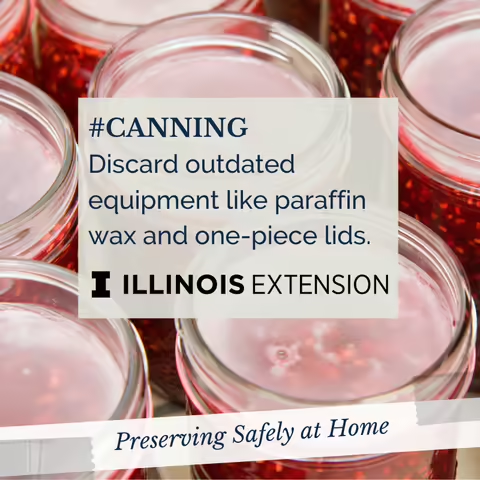URBANA, Ill. – Food preservation techniques, such as canning, freezing, or pickling, increases the shelf-life of food. When done correctly, families have delicious, safe, and healthy food to enjoy throughout the winter months. University of Illinois Extension will provide safe food preservation tips throughout August.
"Many food preservation practices have changed since your grandmother’s time," says Diane Reinhold, Illinois Extension nutrition and wellness educator. "Staying up-to-date is vital to ensure you are producing safe, quality foods for you and your family."
Carefully following tested recipes and using the correct equipment is key, Reinhold says. For example, metal screw bands should be removed from jars after canning to avoid rust forming from moisture under the lids.
Many traditional preservation practices have been determined to increase risk for harmful food-based illnesses. For example, though a mainstay for families in the middle of the 20th century, half-gallon jars are now only recommended for use with acidic fruit juices.
Because of the need for a temperature of 240 degrees, pressure canners are the only safe method for processing many vegetables, meats, poultry, seafood, and soups at home. "It is that combination of high temperature, a prolonged processing time, and acid level that will destroy the bacteria and toxic bacterial spores produced by C. botulinum spores," Reinhold says. Two outdated methods include open kettle and dry canning methods.
Illinois Extension offered a virtual eight-week summer webinar series on home food preservation practices covering a variety of topics raging from the basics on canning, fermenting, freezing, and dehydrating to sessions focused on preserving jams and jellies, pickles, apples, and tomato products. More than 1,500 people attended one or more of the webinars. The Fill Your Pantry: Home Food Preservation recorded webinar series are available online at no cost.
“Recognizing that many people still have questions about home preservation, Illinois Extension will provide a month-long social media campaign providing daily practical tips related to food preservation as a complement to this webinar series,” says Reinhold. Instructional materials are also available for download.
The Illinois Extension Nutrition & Wellness program encourages individuals, families, and communities to live healthier through online and in-person skill sharing. Learn about managing diabetes, safely preserving foods, being food-safe at home and making healthier choices when shopping, cooking and meal planning. Check the website or follow along on Facebook.
SOURCE:
- Diane Reinhold, MPH, MS, RDN, University of Illinois Extension, Nutrition & Wellness Educator
- Download material available @ https://extension.illinois.edu/global/nutrition-and-wellness
- YouTube playlist @ https://www.youtube.com/playlist?list=PLIq7XlTOe3alW3QCZ9PsnExm1wmKANLqW
ABOUT EXTENSION: Illinois Extension leads public outreach for the University of Illinois by translating research into action plans that allow Illinois families, businesses, and communities to solve problems, make informed decisions, and adapt to changes and opportunities.
